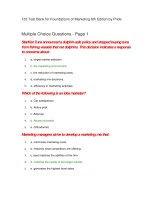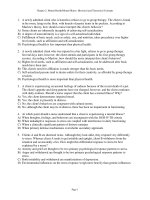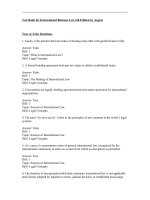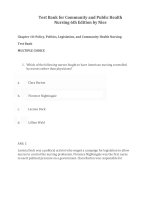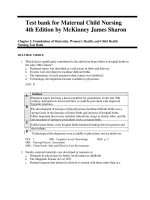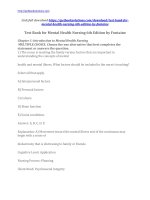Test bank for mental health nursing 6th edition by fontaine
Bạn đang xem bản rút gọn của tài liệu. Xem và tải ngay bản đầy đủ của tài liệu tại đây (686.08 KB, 81 trang )
Link full download: />
Test Bank for Mental Health Nursing 6th Edition by Fontaine
Chapter 1: Introduction to Mental Health Nursing
MULTIPLE CHOICE. Choose the one alternative that best completes the
statement or answers the question.
1) The nurse is teaching the family various factors that are important in
understanding the concepts of mental
health and mental illness. What factors should be included in the nurse’s teaching?
Select all that apply.
A) Interpersonal factors
B) Personal factors
C) Culture
D) Brain function
E) Social conditions
Answer: A, B, C, D, E
Explanation: A) Movement toward the mental illness end of the continuum may
begin with a sense of
disharmony that is distressing to family or friends.
Cognitive Level: Application
Nursing Process: Planning
Client Need: Psychosocial Integrity
B) Movement toward the mental illness end of the continuum may begin with a
sense of
disharmony that is distressing to the individual.
Cognitive Level: Application
Nursing Process: Planning
Client Need: Psychosocial Integrity
C) Behavior that can be considered as being at the mental illness end of the
continuum in one
culture can be considered normal and acceptable in another culture.
Cognitive Level: Application
Nursing Process: Planning
Client Need: Psychosocial Integrity
D) Research has shown that brain chemicals and processes are frequently altered in
mental
illnesses.
Cognitive Level: Application
Nursing Process: Planning
Client Need: Psychosocial Integrity
E) Movement toward the mental illness end of the continuum may begin with a
sense of
disharmony that is distressing to the community or society.
Cognitive Level: Application
Nursing Process: Planning
Client Need: Psychosocial Integrity
2) During the nursing assessment of an adult client, the nurse finds the client’s
beliefs and actions related to
common health practices to be “bizarre.” Which action would be most appropriate
for the nurse to take at this
time?
A) Write a nursing diagnosis to address the “bizarre” beliefs and actions.
B) Repeat the assessment later in the day.
C) Inquire as to the culture with which the client identifies.
D) Communicate the findings to the health care team.
Answer: C
1
Explanation: A) A thorough assessment is needed before proceeding with other
steps of the nursing process.
Cultural beliefs strongly influence what is defined as mental illness or mental health.
Behavior
that is considered bizarre in one cultural context may be considered desirable in
another. While
findings will be communicated and used for nursing diagnosis formulation later in
the process,
these steps are built upon a thorough assessment. Repeating the assessment
without the
cultural assessment will most likely result in the same incomplete data.
Cognitive Level: Application
Nursing Process: Implementation
Client Need: Psychosocial Integrity
B) A thorough assessment is needed before proceeding with other steps of the
nursing process.
Cultural beliefs strongly influence what is defined as mental illness or mental health.
Behavior
that is considered bizarre in one cultural context may be considered desirable in
another. While
findings will be communicated and used for nursing diagnosis formulation later in
the process,
these steps are built upon a thorough assessment. Repeating the assessment
without the
cultural assessment will most likely result in the same incomplete data.
Cognitive Level: Application
Nursing Process: Implementation
Client Need: Psychosocial Integrity
C) A thorough assessment is needed before proceeding with other steps of the
nursing process.
Cultural beliefs strongly influence what is defined as mental illness or mental health.
Behavior
that is considered bizarre in one cultural context may be considered desirable in
another. While
findings will be communicated and used for nursing diagnosis formulation later in
the process,
these steps are built upon a thorough assessment. Repeating the assessment
without the
cultural assessment will most likely result in the same incomplete data.
Cognitive Level: Application
Nursing Process: Implementation
Client Need: Psychosocial Integrity
D) A thorough assessment is needed before proceeding with other steps of the
nursing process.
Cultural beliefs strongly influence what is defined as mental illness or mental health.
Behavior
that is considered bizarre in one cultural context may be considered desirable in
another. While
findings will be communicated and used for nursing diagnosis formulation later in
the process,
these steps are built upon a thorough assessment. Repeating the assessment
without the
cultural assessment will most likely result in the same incomplete data.
Cognitive Level: Application
Nursing Process: Implementation
Client Need: Psychosocial Integrity
3) The nurse is sharing client assessment data with the mental health care team.
Which comment by the nurse is
most likely irrelevant and indicates a misunderstanding of mental illness? “The
client reports:
A) Significant emotional distress about the current situation.”
B) A lot of time is spent in fear and anxiety.”
C) A loss of interest in usual pleasurable interpersonal relationships.”
D) Some very different religious ideas and spiritual beliefs.”
Answer: D
Explanation: A) Religious ideas and spiritual beliefs are culturally grounded and are
not generally labeled as
symptoms of mental illness, unless the deviance is causing a sense of disharmony to
the
individual, family, friends, community, or society. Therefore, this choice indicates a
misunderstanding of the concept of mental illness. Reports of fear, anxiety,
emotional distress,
and disharmony with interpersonal relationships are very relevant and are
indications of the
client’s movement toward the mental illness end of the continuum.
Cognitive Level: Application
Nursing Process: Evaluation
Client Need: Psychosocial Integrity
2
B) Religious ideas and spiritual beliefs are culturally grounded and are not generally
labeled as
symptoms of mental illness, unless the deviance is causing a sense of disharmony to
the
individual, family, friends, community, or society. Therefore, this choice indicates a
misunderstanding of the concept of mental illness. Reports of fear, anxiety,
emotional distress,
and disharmony with interpersonal relationships are very relevant and are
indications of the
client’s movement toward the mental illness end of the continuum.
Cognitive Level: Application
Nursing Process: Evaluation
Client Need: Psychosocial Integrity
C) Religious ideas and spiritual beliefs are culturally grounded and are not generally
labeled as
symptoms of mental illness, unless the deviance is causing a sense of disharmony to
the
individual, family, friends, community, or society. Therefore, this choice indicates a
misunderstanding of the concept of mental illness. Reports of fear, anxiety,
emotional distress,
and disharmony with interpersonal relationships are very relevant and are
indications of the
client’s movement toward the mental illness end of the continuum.
Cognitive Level: Application
Nursing Process: Evaluation
Client Need: Psychosocial Integrity
D) Religious ideas and spiritual beliefs are culturally grounded and are not generally
labeled as
symptoms of mental illness, unless the deviance is causing a sense of disharmony to
the
individual, family, friends, community, or society. Therefore, this choice indicates a
misunderstanding of the concept of mental illness. Reports of fear, anxiety,
emotional distress,
and disharmony with interpersonal relationships are very relevant and are
indications of the
client’s movement toward the mental illness end of the continuum.
Cognitive Level: Application
Nursing Process: Evaluation
Client Need: Psychosocial Integrity
3
4) The psychiatric-mental health nurse is collecting data regarding the client’s
position on the mental
health-mental illness continuum. Which client behavior will be most relevant to the
assessment of insight? The
client is:
A) Laughing at a few humorous aspects of the current situation.
B) Identifying goals and making plans for the future.
C) Demonstrating the ability to accomplish simple problem-solving.
D) Self-evaluating personal values, attitudes, and behaviors.
Answer: D
Explanation: A) The ability to self-evaluate or ask difficult interpersonal questions
and give honest answers
indicates the degree of insight. While finding humor in situations, problem-solving,
identifying
goals and making plans are indications of the mental health factor of resilience;
these do not
directly measure insight.
Cognitive Level: Application
Nursing Process: Assessment
Client Need: Psychosocial Integrity
B) The ability to self-evaluate or ask difficult interpersonal questions and give
honest answers
indicates the degree of insight. While finding humor in situations, problem-solving,
identifying
goals and making plans are indications of the mental health factor of resilience;
these do not
directly measure insight.
Cognitive Level: Application
Nursing Process: Assessment
Client Need: Psychosocial Integrity
C) The ability to self-evaluate or ask difficult interpersonal questions and give
honest answers
indicates the degree of insight. While finding humor in situations, problem-solving,
identifying
goals and making plans are indications of the mental health factor of resilience;
these do not
directly measure insight.
Cognitive Level: Application
Nursing Process: Assessment
Client Need: Psychosocial Integrity
D) The ability to self-evaluate or ask difficult interpersonal questions and give
honest answers
indicates the degree of insight. While finding humor in situations, problem-solving,
identifying
goals and making plans are indications of the mental health factor of resilience;
these do not
directly measure insight.
Cognitive Level: Application
Nursing Process: Assessment
Client Need: Psychosocial Integrity
5) The client’s spouse is verbalizing feelings of guilt and asks the cause of the client’s
mental illness. What is the
nurse’s correct response?
A) “Mental illness is the result of a brain disorder.”
B) “No one really knows the cause of mental illness.”
C) “Why do you think the mental illness occurred?”
D) “Sometimes people just let their problems make themselves sick.”
Answer: A
4
Explanation: A) Genetic and neurobiological data indicate that mental illness is
basically a brain disorder. All
functions of the mind reflect functions in the brain. Research has provided many
theories as to
the cause of mental illness. Even though cultural, intrapersonal, and interpersonal
factors
impact movement on the mental illness-mental health continuum, the overall
causative factors
are neurobiological and not the “fault” of the individual. This “at-fault” belief
contributes to the
stigma associated with mental illness. Asking the spouse their perception as to why
the mental
illness occurred does not take the opportunity to teach, puts the spouse in a
perceived defensive
position, does not answer the spouse’s question, and contributes to the inaccurate
perception
that mental illness might be under personal control.
Cognitive Level: Application
Nursing Process: Implementation
Client Need: Psychosocial Integrity
B) Genetic and neurobiological data indicate that mental illness is basically a brain
disorder. All
functions of the mind reflect functions in the brain. Research has provided many
theories as to
the cause of mental illness. Even though cultural, intrapersonal, and interpersonal
factors
impact movement on the mental illness-mental health continuum, the overall
causative factors
are neurobiological and not the “fault” of the individual. This “at-fault” belief
contributes to the
stigma associated with mental illness. Asking the spouse their perception as to why
the mental
illness occurred does not take the opportunity to teach, puts the spouse in a
perceived defensive
position, does not answer the spouse’s question, and contributes to the inaccurate
perception
that mental illness might be under personal control.
Cognitive Level: Application
Nursing Process: Implementation
Client Need: Psychosocial Integrity
C) Genetic and neurobiological data indicate that mental illness is basically a brain
disorder. All
functions of the mind reflect functions in the brain. Research has provided many
theories as to
the cause of mental illness. Even though cultural, intrapersonal, and interpersonal
factors
impact movement on the mental illness-mental health continuum, the overall
causative factors
are neurobiological and not the “fault” of the individual. This “at-fault” belief
contributes to the
stigma associated with mental illness. Asking the spouse their perception as to why
the mental
illness occurred does not take the opportunity to teach, puts the spouse in a
perceived defensive
position, does not answer the spouse’s question, and contributes to the inaccurate
perception
that mental illness might be under personal control.
Cognitive Level: Application
Nursing Process: Implementation
Client Need: Psychosocial Integrity
D) Genetic and neurobiological data indicate that mental illness is basically a brain
disorder. All
functions of the mind reflect functions in the brain. Research has provided many
theories as to
the cause of mental illness. Even though cultural, intrapersonal, and interpersonal
factors
impact movement on the mental illness-mental health continuum, the overall
causative factors
are neurobiological and not the “fault” of the individual. This “at-fault” belief
contributes to the
stigma associated with mental illness. Asking the spouse their perception as to why
the mental
illness occurred does not take the opportunity to teach, puts the spouse in a
perceived defensive
position, does not answer the spouse’s question, and contributes to the inaccurate
perception
that mental illness might be under personal control.
Cognitive Level: Application
Nursing Process: Implementation
Client Need: Psychosocial Integrity
5
6) The psychiatric-mental health nurse is employed in a community mental health
center that uses a
neurobiological theoretical perspective to guide treatment. The nurse understands
that the neurobiological
principle that supports the use of counseling and therapy is that these treatment
modalities:
A) Increase the client’s capacity for self-discovery of unconscious personality
components.
B) Allow for reinforcement of desirable thoughts, feelings, and behaviors.
C) Create changes through learning that in turn create changes in neuronal
functioning.
D) Encourage completion of developmental tasks that were not successfully
completed earlier in life.
Answer: C
Explanation: A) Neurobiological theory offers the belief that all functions of the
mind reflect functions of the
brain and includes the principle that counseling and therapy can create long-term
changes
through learning which in turn creates changes in neuronal functioning. Selfdiscovery of
unconscious personality components, completion of developmental tasks, and
reinforcement of
desirable thoughts, feelings, and behaviors describe earlier prebiological models of
mental
disorders rather than principles associated with neurobiological theory.
Cognitive Level: Analysis
Nursing Process: Planning
Client Need: Psychosocial Integrity
B) Neurobiological theory offers the belief that all functions of the mind reflect
functions of the
brain and includes the principle that counseling and therapy can create long-term
changes
through learning which in turn creates changes in neuronal functioning. Selfdiscovery of
unconscious personality components, completion of developmental tasks, and
reinforcement of
desirable thoughts, feelings, and behaviors describe earlier prebiological models of
mental
disorders rather than principles associated with neurobiological theory.
Cognitive Level: Analysis
Nursing Process: Planning
Client Need: Psychosocial Integrity
C) Neurobiological theory offers the belief that all functions of the mind reflect
functions of the
brain and includes the principle that counseling and therapy can create long-term
changes
through learning which in turn creates changes in neuronal functioning. Selfdiscovery of
unconscious personality components, completion of developmental tasks, and
reinforcement of
desirable thoughts, feelings, and behaviors describe earlier prebiological models of
mental
disorders rather than principles associated with neurobiological theory.
Cognitive Level: Analysis
Nursing Process: Planning
Client Need: Psychosocial Integrity
D) Neurobiological theory offers the belief that all functions of the mind reflect
functions of the
brain and includes the principle that counseling and therapy can create long-term
changes
through learning which in turn creates changes in neuronal functioning. Selfdiscovery of
unconscious personality components, completion of developmental tasks, and
reinforcement of
desirable thoughts, feelings, and behaviors describe earlier prebiological models of
mental
disorders rather than principles associated with neurobiological theory.
Cognitive Level: Analysis
Nursing Process: Planning
Client Need: Psychosocial Integrity
6
7) The psychiatric-mental health nurse is admitting a new client to the psychiatric
unit. Given the contemporary
neurobiological perspective of mental disorders, the nurse’s priority assessment is:
A) A family history of mental illness.
B) The content and frequency of recent dreams.
C) The degree of satisfaction with interpersonal relationships.
D) A description of self-esteem.
Answer: A
Explanation: A) Neurobiological research theorizes a genetic susceptibility and a
familial genetic anticipation;
therefore, a family history of mental illness becomes priority information in a
nursing
assessment. While self-esteem, interpersonal relationships, and perhaps dreams will
be
assessed at some point, these concepts are derived from earlier prebiological
theories and are
not the priority in this situation.
Cognitive Level: Application
Nursing Process: Assessment
Client Need: Psychosocial Integrity
B) Neurobiological research theorizes a genetic susceptibility and a familial genetic
anticipation;
therefore, a family history of mental illness becomes priority information in a
nursing
assessment. While self-esteem, interpersonal relationships, and perhaps dreams will
be
assessed at some point, these concepts are derived from earlier prebiological
theories and are
not the priority in this situation.
Cognitive Level: Application
Nursing Process: Assessment
Client Need: Psychosocial Integrity
C) Neurobiological research theorizes a genetic susceptibility and a familial genetic
anticipation;
therefore, a family history of mental illness becomes priority information in a
nursing
assessment. While self-esteem, interpersonal relationships, and perhaps dreams will
be
assessed at some point, these concepts are derived from earlier prebiological
theories and are
not the priority in this situation.
Cognitive Level: Application
Nursing Process: Assessment
Client Need: Psychosocial Integrity
D) Neurobiological research theorizes a genetic susceptibility and a familial genetic
anticipation;
therefore, a family history of mental illness becomes priority information in a
nursing
assessment. While self-esteem, interpersonal relationships, and perhaps dreams will
be
assessed at some point, these concepts are derived from earlier prebiological
theories and are
not the priority in this situation.
Cognitive Level: Application
Nursing Process: Assessment
Client Need: Psychosocial Integrity
8) The psychiatric-mental health nurse is planning interventions for a client using
the diathesis-stress model as a
theoretical guide. Given this framework, which of the following nursing
interventions should be included in the
plan of care?
A) Teach anxiety management skills for use in various situations.
B) Assist to identify ways to achieve self-actualization.
C) Assist to identify strategies to delay gratification.
D) Teach common defense mechanisms.
Answer: A
7
Explanation: A) The diathesis-stress model proposes that disease develops in
biologically vulnerable persons
when exposed to stressors; therefore, anxiety management skills to decrease the
impact of the
stressors are appropriate and should be included as interventions. Defense
mechanisms and
gratification issues (Freud), and self-actualization (Maslow) are associated with
older
intrapersonal and social-interpersonal theories.
Cognitive Level: Application
Nursing Process: Planning
Client Need: Psychosocial Integrity
B) The diathesis-stress model proposes that disease develops in biologically
vulnerable persons
when exposed to stressors; therefore, anxiety management skills to decrease the
impact of the
stressors are appropriate and should be included as interventions. Defense
mechanisms and
gratification issues (Freud), and self-actualization (Maslow) are associated with
older
intrapersonal and social-interpersonal theories.
Cognitive Level: Application
Nursing Process: Planning
Client Need: Psychosocial Integrity
C) The diathesis-stress model proposes that disease develops in biologically
vulnerable persons
when exposed to stressors; therefore, anxiety management skills to decrease the
impact of the
stressors are appropriate and should be included as interventions. Defense
mechanisms and
gratification issues (Freud), and self-actualization (Maslow) are associated with
older
intrapersonal and social-interpersonal theories.
Cognitive Level: Application
Nursing Process: Planning
Client Need: Psychosocial Integrity
D) The diathesis-stress model proposes that disease develops in biologically
vulnerable persons
when exposed to stressors; therefore, anxiety management skills to decrease the
impact of the
stressors are appropriate and should be included as interventions. Defense
mechanisms and
gratification issues (Freud), and self-actualization (Maslow) are associated with
older
intrapersonal and social-interpersonal theories.
Cognitive Level: Application
Nursing Process: Planning
Client Need: Psychosocial Integrity
9) The psychiatric-mental health nurse attends a presentation on various theories of
mental disorders. Which
comment by the psychiatric nurse indicates an understanding of intrapersonal
theories of personality
development?
A) “Personality is manifested only in a person’s interactions with another person or
group.”
B) “Personality is more strongly shaped by events occurring in the earliest years of
life than by those
occurring later.”
C) “Every human’s personality is genetically driven and individually developed.”
D) “People become who they are through a learning process using reinforcements
and punishments.”
Answer: B
Explanation: A) Intrapersonal theorists believe that personality is shaped by events
occurring in the earliest
years of life. This theory states that symptoms of mental disorders are rooted in
events in the
first five years of life. The theory that personality is genetically driven and
individually
developed is consistent with neurobiological theory. The theory that personality is
manifested
only in a person’s interactions with others is more congruent with socialinterpersonal theory,
particularly Harry Stack Sullivan. The theory that people become who they are
through a
learning process using reinforcements and punishments reflects behavioral theory,
particularly
B.F. Skinner.
Cognitive Level: Analysis
Nursing Process: Evaluation
Client Need: Psychosocial Integrity
8
B) Intrapersonal theorists believe that personality is shaped by events occurring in
the earliest
years of life. This theory states that symptoms of mental disorders are rooted in
events in the
first five years of life. The theory that personality is genetically driven and
individually
developed is consistent with neurobiological theory. The theory that personality is
manifested
only in a person’s interactions with others is more congruent with socialinterpersonal theory,
particularly Harry Stack Sullivan. The theory that people become who they are
through a
learning process using reinforcements and punishments reflects behavioral theory,
particularly
B.F. Skinner.
Cognitive Level: Analysis
Nursing Process: Evaluation
Client Need: Psychosocial Integrity
C) Intrapersonal theorists believe that personality is shaped by events occurring in
the earliest
years of life. This theory states that symptoms of mental disorders are rooted in
events in the
first five years of life. The theory that personality is genetically driven and
individually
developed is consistent with neurobiological theory. The theory that personality is
manifested
only in a person’s interactions with others is more congruent with socialinterpersonal theory,
particularly Harry Stack Sullivan. The theory that people become who they are
through a
learning process using reinforcements and punishments reflects behavioral theory,
particularly
B.F. Skinner.
Cognitive Level: Analysis
Nursing Process: Evaluation
Client Need: Psychosocial Integrity
D) Intrapersonal theorists believe that personality is shaped by events occurring in
the earliest
years of life. This theory states that symptoms of mental disorders are rooted in
events in the
first five years of life. The theory that personality is genetically driven and
individually
developed is consistent with neurobiological theory. The theory that personality is
manifested
only in a person’s interactions with others is more congruent with socialinterpersonal theory,
particularly Harry Stack Sullivan. The theory that people become who they are
through a
learning process using reinforcements and punishments reflects behavioral theory,
particularly
B.F. Skinner.
Cognitive Level: Analysis
Nursing Process: Evaluation
Client Need: Psychosocial Integrity
